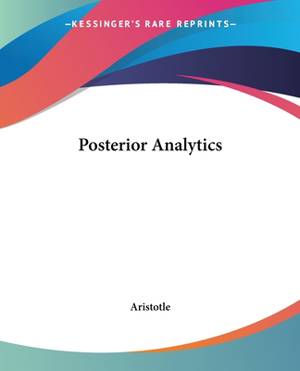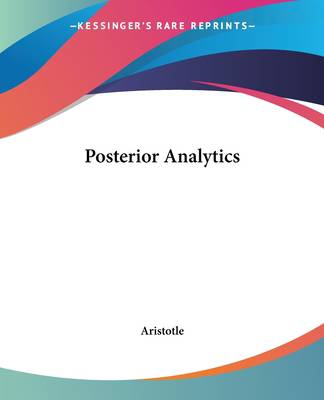
- Retrait gratuit dans votre magasin Club
- 7.000.000 titres dans notre catalogue
- Payer en toute sécurité
- Toujours un magasin près de chez vous
- Retrait gratuit dans votre magasin Club
- 7.000.0000 titres dans notre catalogue
- Payer en toute sécurité
- Toujours un magasin près de chez vous
Description
Posterior Analytics is a philosophical treatise written by the ancient Greek philosopher Aristotle. The book is a systematic exploration of the nature of scientific knowledge, and it is considered one of the most important works on logic and epistemology in Western philosophy.In the book, Aristotle sets out to explore the principles of scientific inquiry and to establish a framework for understanding the nature of knowledge. He argues that scientific knowledge is based on demonstrable truths that are derived from first principles through deductive reasoning.The book is divided into two parts. The first part focuses on the nature of demonstration, the types of propositions that can be demonstrated, and the conditions necessary for a demonstration to be valid. The second part explores the process of scientific inquiry, including the role of induction in scientific discovery, the relationship between definition and demonstration, and the principles of scientific explanation.Throughout the book, Aristotle emphasizes the importance of empirical observation and the need for rigorous logical analysis in scientific inquiry. He also discusses the relationship between scientific knowledge and other forms of knowledge, such as opinion and belief.Overall, Posterior Analytics is a foundational work in the history of philosophy, and it continues to be studied and debated by scholars today. Its insights into the nature of scientific inquiry and the principles of logical reasoning have had a profound influence on Western thought and continue to shape our understanding of the world around us.ALL instruction given or received by way of argument proceeds from pre-existent knowledge. This becomes evident upon a survey of all the species of such instruction. The mathematical sciences and all other speculative disciplines are acquired in this way, and so are the two forms of dialectical reasoning, syllogistic and inductive.This scarce antiquarian book is a facsimile reprint of the old original and may contain some imperfections such as library marks and notations. Because we believe this work is culturally important, we have made it available as part of our commitment for protecting, preserving, and promoting the world's literature in affordable, high quality, modern editions, that are true to their original work.
Spécifications
Parties prenantes
- Auteur(s) :
- Editeur:
Contenu
- Nombre de pages :
- 80
- Langue:
- Anglais
Caractéristiques
- EAN:
- 9781419142703
- Date de parution :
- 17-06-04
- Format:
- Livre broché
- Format numérique:
- Trade paperback (VS)
- Dimensions :
- 190 mm x 239 mm
- Poids :
- 154 g

Les avis
Nous publions uniquement les avis qui respectent les conditions requises. Consultez nos conditions pour les avis.






